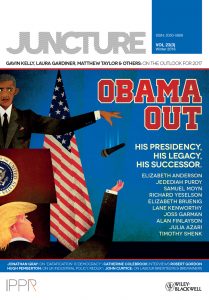Masculinity Breaking Bad: Walter White and the Fallouts from Complicit Masculinity

[amctv.com http://media.amctv.com/img/originals/breakingbad/downloads/Season_5B/BBS5B-1024×768-A.jpg]
AMC’s award-winning and groundbreaking drama Breaking Bad is, although complemented by a number of highly intriguing and well-played characters, primarily the story of its lead protagonist Walter White, a disillusioned high school chemistry teacher diagnosed with terminal cancer, who turns to cooking crystal meth in order to provide for his family’s financial security after he will have passed away. Thus, Breaking Bad is a reflection on the destructive potential of masculinity in our society.
Even though we as viewers start out as sympathetic to Walt, over the course of the show, we realize just how problematic Walt’s actions and motives are, and that – although he tries to justify his actions as selfless and as rooted in his commitment to serving his family – what really drives him are notions of masculinity deeply entrenched in our society. Even if we accept that his willingness to become a producer of illegal substances (and eventually kill repeatedly) stems from his urge to set his family up with a financial safety net in anticipation of his imminent deaths, this ability to put aside all moral convictions for the sake of achieving his goal is clearly more than a simple act of one man’s altruism but rather embedded in hegemonic notions of masculinity. Despite shifts in the gender order, our society still expects men to take on the role of the provider and rewards those men who can, while shaming those that cannot. It is no surprise then that Walter White would make a desperate if illegal final attempt at living up to this standard, given that he appears to be running out of time. In addition to these internalized self-identification as the provider of his family – even beyond his grave – the social arrangements and gender relations in our society, and those within the White family more specifically, exert very real and material pressures on Walt to take steps to ensure the financial future of his wife and kids. The White family adheres to dominant social scripts about family life in the US, with Walt filling the role of the primary breadwinner, while his wife Skyler is a mother and homemaker first, working odd jobs and in later seasons being employed as an accountant. Clearly, due to these unequal gendered relations of production – and against the backdrop of a healthcare system that is failing Walt, and a social security system that would most likely fail the White family sans Walt – the possible death of Walter will put the family in deep financial problems, prompting him to find a solution for these economic pressures.
The more we learn about the protagonist over the course of the series, however, the more we understand that Walt’s motives are, at least in part, darker and rooted in additional notions of masculinity. After having lied to his family, the viewers (and possibly himself) that he had committed all these atrocities and had put his family into danger only in order to provide for them, Walt finally admits in the series finale what the viewers have figured out a long time ago: He built his meth empire because he was was the best at what he did, because he took pride in his achievements and because the power it provided him with validated his sense of self. Or put differently, it made him feel like a man. Walt’s character can be described as what RW Connell calls an exemplar of complicit masculinity: Our society upholds hegemonic notions of masculinity, that are only ever achieved by a small minority of (white, upper/ middle class, powerful, able bodied, straight, Western, …) men, who reap the most benefits from these gendered arrangements, while other men relate in different ways to these hegemonic masculinities. However, it is not as though men outside the hegemonic position reject the hegemonic notions. Rather a majority falls within the category of ‘complicit masculinities’: These men hold on to the goal of achieving hegemonic status, buying into dominant conceptions and thereby legitimizing and reproducing them, while at the same time shouldering the dangers inherent in these constructions of masculinity. At the same time, by being complicit with hegemonic masculinities they receive at least some of the benefits of a gender order that overall privileges men vis a vis women. The Walter White we meet in the pilot episode is far from being able to lay claim to hegemonic masculinity: His work as a high school teacher is far below his aspirations and potential as a scientist, he has just been diagnosed with a disease that will make his 50 year old body weaker and weaker (and will ultimately prevent him from even fulfilling the most basic requirement of masculinity in our culture, that is, providing financially for his wife and children), and his sex life has been reduced to the occasional hand job by his wife – while she monitors her ebay auctions on the laptop screen.
It is being involved in the meth business (and the dangers and violence that comes with it) that, for the first time in years, enables Walt to approach hegemonic notions of masculinity. Walt takes pride in his meth cooking craftsmanship, and in the power his new profession provides him with. It is no coincidence that after Walt comes home from one of his first meth cooking sessions and the killing of a rival drug crew, he approaches his wife with a new found passionate-aggressive sexuality, feeling masculine for the first time in a long time.
The more we learn about Walt’s back story, the more we realize that Walt’s motive for entering (and later on choosing not to leave the drug business despite having made enough money to set his family up for life) is rooted in his repeated pattern of feeling emasculated. Before settling for a teaching profession at a high school, Walt had been a brilliant chemist and had co-founded a company that was soon to bring in hundreds of millions of dollars in profits with his graduate school friends Elliot and Gretchen, his girlfriend at the time. Although Walt claims his two friends have betrayed him, we learn that it was Walt who had walked out on Gretchen; a decision clearly rooted in his claim to notions of masculinity as he was unable to cope with having a partner professionally his equal and superior in her class background. It is Walt’s adherence to and insecurity about masculinity that thus lead him to adandon his girlfriend and the opportunity to become rich and successful (and later blaming her for it), which, of course, results in an even deeper feeling of emasculation as he finds himself stuck in a mundane life, ultimately setting forth his transformation from Walt to the larger-than-life drug kingpin Heisenberg as a last ditch effort to achieve the standards of masculinity he buys into.
That these notions of masculinity matter culturally far beyond the fictional Walt’s individual motivations is also obvious in the audience’s response to Walt’s trajectory. Even though it is safe to say that many fans watching the show transitioned from empathizing with Walt to strongly feeling he deserves to die or end up in cuffs, the internet is nevertheless populated by a significant number of fans intrigued by his Heisenberg persona; as exemplified by the vast amount of paraphernalia adorned with Heisenberg’s face and his catchphrases. Rather than judging Walt for what he has done, these fans continue to root for him because of his badass masculinity and the fact that he is playing the game according to his rules, bowing to no one.
And like us viewers, even the show’s writers and producers ultimately cannot escape the appeal of Walt’s story of achieving masculinity. Although Walt has been stripped of everything that was once dear to him (his family, his meth empire, even avenues of providing his family with the remainder of his drug money), and is bound to find his fitting end and succumb to his cancer alone in a cottage somewhere in the New Hampshire backcountry, the show ultimately is not able to tell a story of his lonesome demise or the humiliation of his turning himself in to the police. Instead, we are presented with one last stand of Walt in Heisenberg-mode, as he not only comes up with a plan for secretly providing his family with his drug money but also executes Todd, the psychopath meth cook and his uncle’s white supremacist drug crew – probably the only form of antagonist that could be construed as clearly even more morally objectionable than Walter White – leaving Walt to go out on his own terms and perpetrating one more act of heroic-tragic vengeful violence. As Vince Gilligan, producer of the show, pointed out on the Breaking Bad Insider podcast, the writers felt that Walt had earned being able to die ‘like a man’, and, although redemption at this point is impossible, we thus get the closest thing to it: Although Walter is never able to achieve all-out hegemonic masculinity – since working toward it by building a meth empire comes with high risks, violence, murder and ultimately results in his own death – we are presented with an ending that shows the protagonist dying a relatively honorable death, at least given the alternatives, glossing over the fact that it was Walt’s hyperidentification with notions of masculinity that lead him down this road in the first place.
Ultimately, understanding Walter White as a character stuck in a hopeless version of complicit masculinity makes clear that the title of the show conveys more than it seems: Over the course of the show, Walter White’s masculinity is breaking bad, transforming him from the average father and husband into a manipulative serial killer and drug kingpin. Rather than suffering from a case of inherently broken masculinity, it is hegemonic notions – and complicit embodiments – of masculinity in our society that are necessarily structured in a way that allow for this process of breaking bad, carrying with them the potentiality of destruction, violence and death. Walter White is not automatically and inherently Heisenberg. But the toxic notions of masculinity dominant in our society and the unequal class and gender orders that prevail at the very least carry the potential of him transitioning from one to the other.
Further Reading:
Connell, RW. 1995. Masculinities. University of California Press.
Kimmel, Michael. 1998. Manhood in America. A Cultural History. Oxford University Press.






Nicely done. This post captures the intricacies of the show. I’ve seen a few blog posts recently that really emphasize Walt’s problematic masculinity, but forget that the audience (mostly) is no longer rooting for Walt by the end, but rather mourning everything that he loses to his Heisenberg alter-ego. But you’re also right to point out that some fans, and the producers, still want Walt to “die like a man”, forgetting that it is this drive to ‘be a man’ that has literally ruined his life. I also think you really tie in the class and race issues nicely, which many other analyses have left out. His aspirations are rooted in classed desires as much as gendered ones (and class and gender a mutually constitutive). All around, really insightful piece.
Very insightful piece. Really exposes not only the hegemonic masculine meaning behind the character walter white, but also picks out the negotiation process in which the dominant structure consents with the subordinates: being everyone walter has explained his complicity as “for his family” but really was for the drive of his own embodied masculinity he never got to achieve until .. Heisenberg. this is very helpful to the hegemony paper I will be writing for my popular culture course, thanks